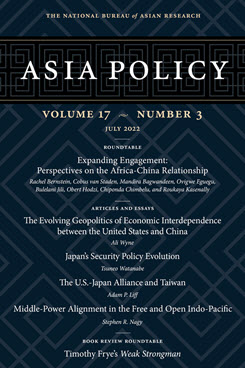Japan’s Security Policy Evolution
The Interaction between Think Tank Proposals and Government Implementation
This essay spotlights interactions between private think tanks’ security policy proposals and the development of the Japanese government’s security policies since 1995, identifies items on the current security policy agenda, and suggests the future direction of Japan’s security policy.
Note: This is the second in a series of four Asia Policy essays in 2022–23 on “A U.S.-Japan Partnership for a New Era,” made possible by the generous support of the U.S.-Japan Foundation.
EXECUTIVE SUMMARY
MAIN ARGUMENT
Japan’s defense and security policy is steadily moving in a pragmatic and proactive direction toward becoming a “normal country” through “passive realism,” although the direction and speed of change is not dramatic or linear. Interactions between think tanks’ policy recommendations and the government’s realization of them since 1995 illustrate in part this development process. For example, following a committee’s suggestions to revitalize the Japan-U.S. alliance to deal with contingencies on the Korean Peninsula, the Japanese government adopted a related law after it agreed upon the 1997 Guidelines for Japan-U.S. Defense Cooperation with its U.S. counterpart. The Abe cabinets implemented many ambitious policies suggested in think tank proposals, including permitting the exercise of the right of collective defense, creating the National Security Council, and establishing the National Security Strategy. Currently, the Japanese government is conducting a series of conversations with security experts to revise the National Security Strategy and the ruling LDP has announced a general policy proposal. The proposal recommends that the Kishida cabinet initiate the development of an indigenous counterstrike capability and increase the defense budget toward 2% of GDP. Past interactions between policy think tanks and the Japanese government suggest that the government will continue to take steps toward becoming a so-called normal country, although such steps could be gradual and incremental.
POLICY IMPLICATIONS
- Japan should continue to implement a realistic security policy agenda, which will contribute not only to its survival but to regional stability in the new era following the post–Cold War.
- The U.S. should encourage and cooperate with Japan’s proactive development of its realistic and pragmatic security policy since it will be important both to regional stability and to a sustainable U.S. security strategy in the face of threats from an assertive Russia and China.
- Japan and the U.S. should collaborate on research and development in defense and dual-use technology, which are critical for Japan’s sustainable development of its defense capability and industrial base.
Tsuneo Watanabe is a Senior Fellow at the Sasakawa Peace Foundation (Japan). His research interests include the Japan-U.S. alliance, Asian security, and the politics and diplomacy of Japan and the United States.
About Asia Policy
Asia Policy is a peer-reviewed scholarly journal presenting policy-relevant academic research on the Asia-Pacific that draws clear and concise conclusions useful to today’s policymakers. Asia Policy is published quarterly in January, April, July, and October and accepts submissions on a rolling basis. Learn more


